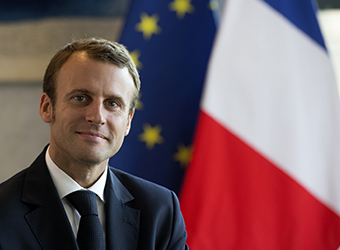The election of Emmanuel Macron as France’s 25th president was simultaneously the appointment of one of the European Union’s key figureheads, throwing up new questions about what the union’s stance on upcoming Brexit negotiations is likely to be.
Macron, a staunch Europhile who has set re-integration of the EU and the delivery of an economic resurgence chief among his ambitious presidential goals, has already been clear that he considers the U.K.’s decision to leave the European project a “serious mistake.”
Likening Brexit to the “Guernsification” of the U.K., Macron said during campaigning that, far from taking back control, Britain had signed itself up to a future of servitude and subordinate status, much like the island of Guernsey.
However, hours after the 39-year-old’s victory, his economic advisor was quick to take to the airwaves to say that Macron would not push for a hard Brexit.
So, what sort of deal can he be expected to endorse?
‘A demanding partner’
Macron’s advisor Jean Pisani-Ferry told the BBC Radio 4’s Today Programme that the president-elect would be a “demanding partner” with an absolute interest in securing the future of the union, though he would not seek to punish the U.K.
“I don’t think anyone has an interest in a hard Brexit. There is a mutual interest in keeping prosperity,” Pisani-Ferry said on Monday.
“At the same time,” he cautioned, “we have divergent interests and there will be tough negotiations and he will be tough.
“Punish, certainly not. But he (Macron) believes that today Europe is part of the solution to the problems we are facing, so he’s a very committed pro-European and he’s not the kind of man who would implicitly agree with the dismantling of the EU.”
Though the French election has now past, opening up the European political agenda for Brexit talks, which are due to gain traction in June, Macron will also have a country on which to make his mark.
The former banker’s electoral success was based largely on his pledge to secure national interests and implement major reforms to boost the economy and trim its stubbornly high unemployment levels.
While he is expected to put the continuation of the single market at the fore of his demands, discussions over the U.K.’s exit deal are likely to form just part of the president’s newly busy agenda.
Reports emerged last week that the U.K. could be slapped with a 100 billion euro ($109 billion) “divorce bill” from the EU, the highest estimate attached so far to the price of Brexit.
EU Commissioner Pierre Moscovici told CNBC Monday no figure has yet been officially confirmed but stated that there would be a price.
“We need to be clear that being a member of the club is better than to be out of the club – that is the price to pay.
“This price is not a punishment, it is just the pricing of what we have to solve if you want to get a deal.”
British Prime Minister Theresa May was quick to take to Twitter shortly after the outcome to congratulate the new President.
Though Macron is set to be forceful in his pro-European approach, a win for his far-right anti-EU opponent Marine Le Pen, who fought for a referendum on France’s EU membership, would likely have thrown the union into disarray.
This could well have resulted in a poor deal, or indeed no deal, for the U.K.
Source: CNBC



